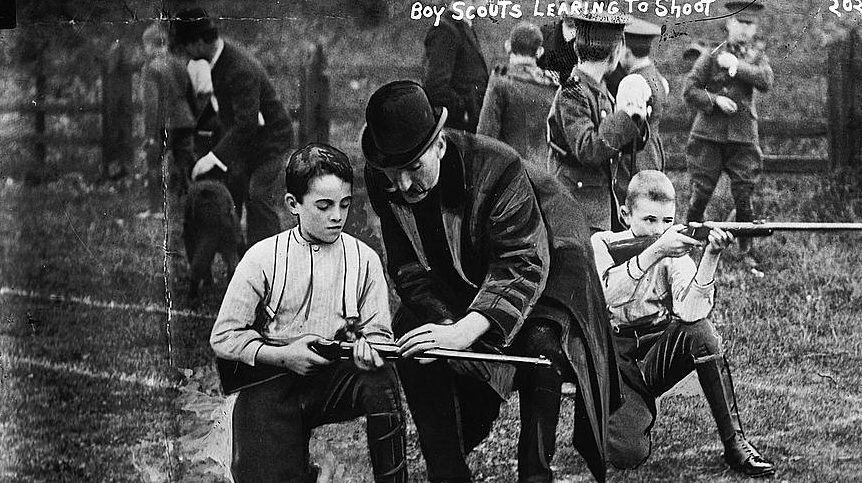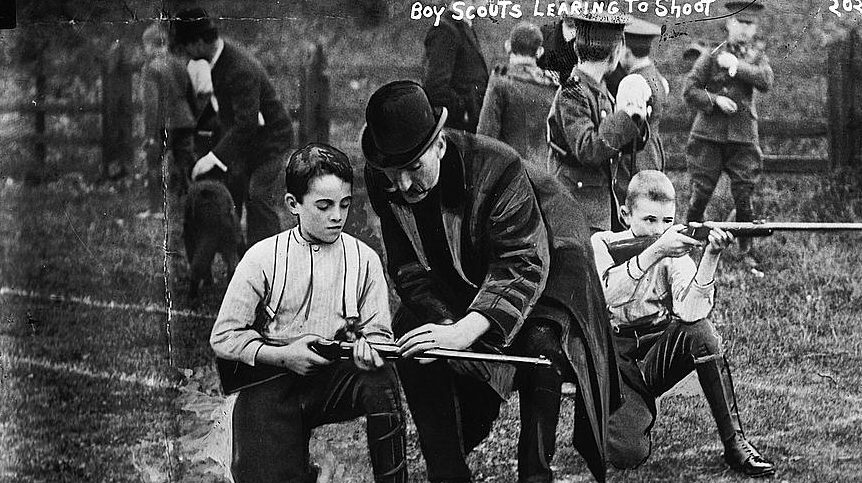An Old Boy Scout’s Journey – Part 1, by Rocket J. Squirrel


What prompted me to begin preparing? I am not certain if there was one specific trigger. I’d like to share my journey to becoming “more” prepared? If you have recently realized that you need to be prepared to take care of your family, your community and your country in the event that really bad things happen, then hopefully my journey will encourage you. Maybe not, since it has taken me so long. I am still on the journey, still learning, still implementing new things about which I learn. My perspective continues to change.
My beautiful bride and I are not retreat owners, we live in the suburbs. I have accepted that I need to be ready where I am, as we presently have no place to which we can bug out. As Mr. Rawles points out, bugging out is far from the ideal scenario as it will be filled with potential dangers. I look forward to the day when we can move away from the crowds to the mountains that we love so much; maybe the Sierra Nevada Mountains, maybe the Rocky Mountains, or maybe a property will become available on The Unnamed River. Until that day, I will do my best, here in this part of God’s Country.
One purpose in my writing is to share the choices that I have made with those who may be just starting on your preparedness journey. This is a summary of many complex subjects. There are so many choices to make when you start preparing, and so many conflicting opinions about which is the best option. Some think they have to get everything done now, once the preparedness floodgates have been opened. This can be overwhelming.
What should be the first priority – other than everything? What is the best solution for water storage, ammunition caliber, etc.? Implementing only the “best” solution can be a roadblock to action. Know that making a reasonable choice and implementing that choice is better than endless research and a lack of action. Accept the fact that as you learn more, your opinion on what you have implemented may change. It is okay to change your mind. If you change your mind then adjust your plans, your equipment and your training as you see fit.
Focus on Knowledge, Skills, and Training
Avoid just collecting the latest gadgets and doodads. Instead, focus on knowledge, skills and training. Gear and equipment are required, but a well-trained person who has the correct mindset and is stranded somewhere without their equipment will likely fare much better than someone who has only collected gear without the knowledge and training to use it.
Another purpose in writing this article is to show that, at least in my case, getting prepared takes a while and it really never ends. Being prepared truly is a journey. We each come from different backgrounds and come to the realization at different times in our lives that bad things can happen. I wish that I would have accomplished more preparations sooner. I encourage you to make time in your schedule to do what you can afford to do now, and make a plan for future actions.
I was a Boy Scout, although it was for only a short time. Maybe that is where I picked up my inclination to always “Be Prepared.” While in high school I joined the Explorer Scouts, a Post that focused on backpacking. We learned that we should always take the “Ten Essentials” with us when backpacking or even when just out hiking for the day. Here are lists of the Ten Essential from The Mountaineers and REI.
Christian Faith
In 1992 my beautiful bride and I both became Christians. I grew up attending Church, but at that point I “knew that I knew” that I was saved from sin and hell by the Creator of the heavens and the earth having sacrificed the life of His Son (Jesus of Nazareth, the Messiah) to pay for my sins and redeem me. I started listening regularly to local KWVE Christian radio. I was drawn to the teaching of Chuck Missler. His program, 66/40, is still available on some radio stations and as a podcast on their web site. Chuck started doing a Strategic Perspectives program every year or two. He talked about current world events from a Biblical perspective and how we should respond. Being prepared was one response often mentioned. Chuck made an observation about the Jews in Germany before World War II. Some Jews were given wisdom, saw bad things on the horizon and chose to leave Germany in advance of the Holocaust. They escaped to their Redoubts. A few were preserved by God through the Holocaust. But millions were not so fortunate and were murdered by Adolph Hitler and the Nazis.
One reference in the Strategic Perspectives cassette tape package was to a book Preparing for Emergencies by James McKeever. I bought the book. This was long before SurvivalBlog started. The following are the basic categories for preparedness from the book, and how I have addressed each. (An even better starting point is Mr. Rawles’ List-of-Lists or his book, How to Survive the End of the World as We Know It.)
- Water
- Light and Heat
- First Aid
- Fire Fighting
- Self Defense
- Food
The following is a description of supplies and training I have implemented. Also described are things that are on my list to be done. All of the specific brands/models of equipment and the stores or web sites mentioned are the equipment I own and the supply sources which I used. You are encouraged to investigate what is best for your situation and shop around for high quality gear at low prices. The internet is an amazing tool; make good use of it. Make certain to remain anonymous and use a VPN as Mr. Rawles recommends.
Water:
When the power for the water distribution system fails, we will have no water from the municipal water supply system. (For those of you who have a private well with an electric pump, you will need a back-up power source for your pump, or a manual pump.) Since I was living in prime earthquake country (the “big one” could happen at any time) I started preparing by purchasing four 55-gallon food-grade water barrels and filling them with water. The barrels were placed in the garage on pieces of plywood to keep the water from absorbing the concrete “flavor.” Sanitize the inside of the barrels with chlorine bleach before filling then add some residual bleach after filling with water and before sealing the drums.
I considered larger and smaller containers but this size seemed the best for me. They fit nicely in the garage along the side wall (they are 24” diameter) and you can store stuff on top of them (protect the tops) and place shelf units straddling/over them. (I got a barrel a few years ago for my daughter at her local Wal-Mart using the ship-to-store option for about $80.) I purchased a bung wrench, drum pump and siphon hoses for dispensing water from the barrels. Seven-gallon cube shaped Reliance Aqua-Tainer water containers are stored in my garage and will enable collection and transportation of water if needed.
I got some Polar Pure iodine for water purification and gravity filters with ceramic elements from Katadyn and Berkey. We use the Berkey daily for our drinking water. An Underhill Gulp hand pump, the kind landscapers use to remove water from valve boxes, will be handy for collecting water if it ever comes to that. If you live in an apartment, maybe a WaterBOB will be a good option; but that is only useful if you have warning in advance of the need so you can fill the container, such as with hurricanes. A WaterBOB provides no preparation against a surprise outage. I kept some filled 7-gallon containers in a closet when we lived in an apartment.
Light and Heat
At our current home the climate is such that we did not/do not have to worry about winter heating for survival, as do those who live in the Great White North. We could just put on extra clothes and still be comfortable; nothing life threatening. So, no back-up heat is required for us. For light we have flashlights, headlamps, lots of batteries (alkaline, lithium, rechargeable), battery chargers, various big candles collected over the years, a case of tea lights from the local Big Lots store, and a trusty hand-me-down Coleman lantern with extra mantles. The to-do list includes getting some solar panels for recharging batteries.
(To be continued tomorrow, in Part 2.)
